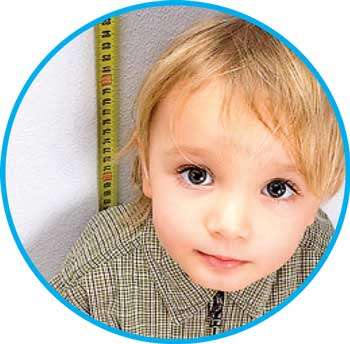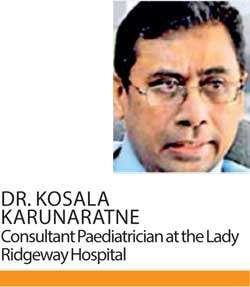06 Apr 2018 - {{hitsCtrl.values.hits}}
 Each one grows and matures differently. If your child doesn’t seem to be growing at the normal growth rate give his/her age, there is a fair possibility that such children may have a growth disorder which could affect individual development. The Health Capsule got in touch with Dr. Kosala Karunaratne, Consultant Paediatrician at the Lady Ridgeway Hospital to shed more light on the topic
Each one grows and matures differently. If your child doesn’t seem to be growing at the normal growth rate give his/her age, there is a fair possibility that such children may have a growth disorder which could affect individual development. The Health Capsule got in touch with Dr. Kosala Karunaratne, Consultant Paediatrician at the Lady Ridgeway Hospital to shed more light on the topic
Growth disorders in children can be identified when the child has reached an age where physical development is quite prominent. If you notice that a child’s height develops slower or rather faster than other children of the same age, there is a chance that the child may have a growth disorder
 A growth disorder means that a child has an unusual growth. For an example, if your child seems to be growing slower or faster than other children of the same age, it could mean that the child has a growth disorder. “It is important to remember that growth is a slow process and is measured over months and it’s a complex process between genetic, nutritional and hormonal factors. If there is no visibility of growth, the delay could be due to an underlying health condition or it could simply be due hereditary factors” Dr. Karunaratne said.
A growth disorder means that a child has an unusual growth. For an example, if your child seems to be growing slower or faster than other children of the same age, it could mean that the child has a growth disorder. “It is important to remember that growth is a slow process and is measured over months and it’s a complex process between genetic, nutritional and hormonal factors. If there is no visibility of growth, the delay could be due to an underlying health condition or it could simply be due hereditary factors” Dr. Karunaratne said.
Some common growth disorders in children include,
Growth Hormone Deficiency
Growth Hormone Deficiency is a disorder that involves the pituitary gland which produces the growth hormone and other hormones. The growth hormone is needed for normal growth and development in children.
Constitutional growth delay and delayed puberty
According to Dr. Karunaratne, constitutional growth delay and delayed puberty are common conditions in which puberty and its associated growth spurt occur at a later age than usual.
“Growth disorders in children can be identified when the child has reached an age where physical development is quite prominent. If you notice that a child’s height develops slower or rather faster than other children of the same age, there is a chance that the child may have a growth disorder. When it comes to younger children, for example in infants, you could identify growth disorders if you pay attention to their weight and the ability to gain weight” he added.
 As much as pathological reasons may be the cause for these growth disorders, the chances that these growth disorders are due to hormonal reasons are very likely. It is also extremely important that you pay attention to the genetic factors as well. For an example, the delay in growth and height could be due to genetic factors. The child may have parents who are either short or tall, and these genes may have been passed on to them. For an example, pygmys have a resistance to the growth hormone and it’s an inherent factor. These factors undoubtedly play a major part when it comes to the initial diagnosis.
As much as pathological reasons may be the cause for these growth disorders, the chances that these growth disorders are due to hormonal reasons are very likely. It is also extremely important that you pay attention to the genetic factors as well. For an example, the delay in growth and height could be due to genetic factors. The child may have parents who are either short or tall, and these genes may have been passed on to them. For an example, pygmys have a resistance to the growth hormone and it’s an inherent factor. These factors undoubtedly play a major part when it comes to the initial diagnosis.
The most prominent symptoms of growth disorders other than the short stature are mostly hyperthyroidism in neonatal children. Hyperthyroidism occurs when the thyroid gland doesn’t supply the proper amount of hormones that the body requires
“The most prominent symptoms of growth disorders other than the short stature are mostly hyperthyroidism in neonatal children. Hyperthyroidism occurs when the thyroid gland doesn’t supply the proper amount of hormones that the body requires. Thyroid hormones are important because they modulate energy metabolism and influences growth and development. The growth hormone (GH) is essential when it comes to the growth and development in children and this is produced by the pituitary gland. Too much growth hormone is also known to cause gigantism in children. Damaged pituitary glands are common in most children who seem to have growth disorders. Growth is a complex process and it’s of utmost importance that you pay attention to genetic, hormonal and nutritional factors when it comes to diagnosis and treatment” the doctor concluded.

22 Dec 2024 9 hours ago
22 Dec 2024 9 hours ago
22 Dec 2024 22 Dec 2024
22 Dec 2024 22 Dec 2024
22 Dec 2024 22 Dec 2024